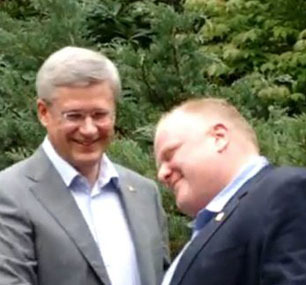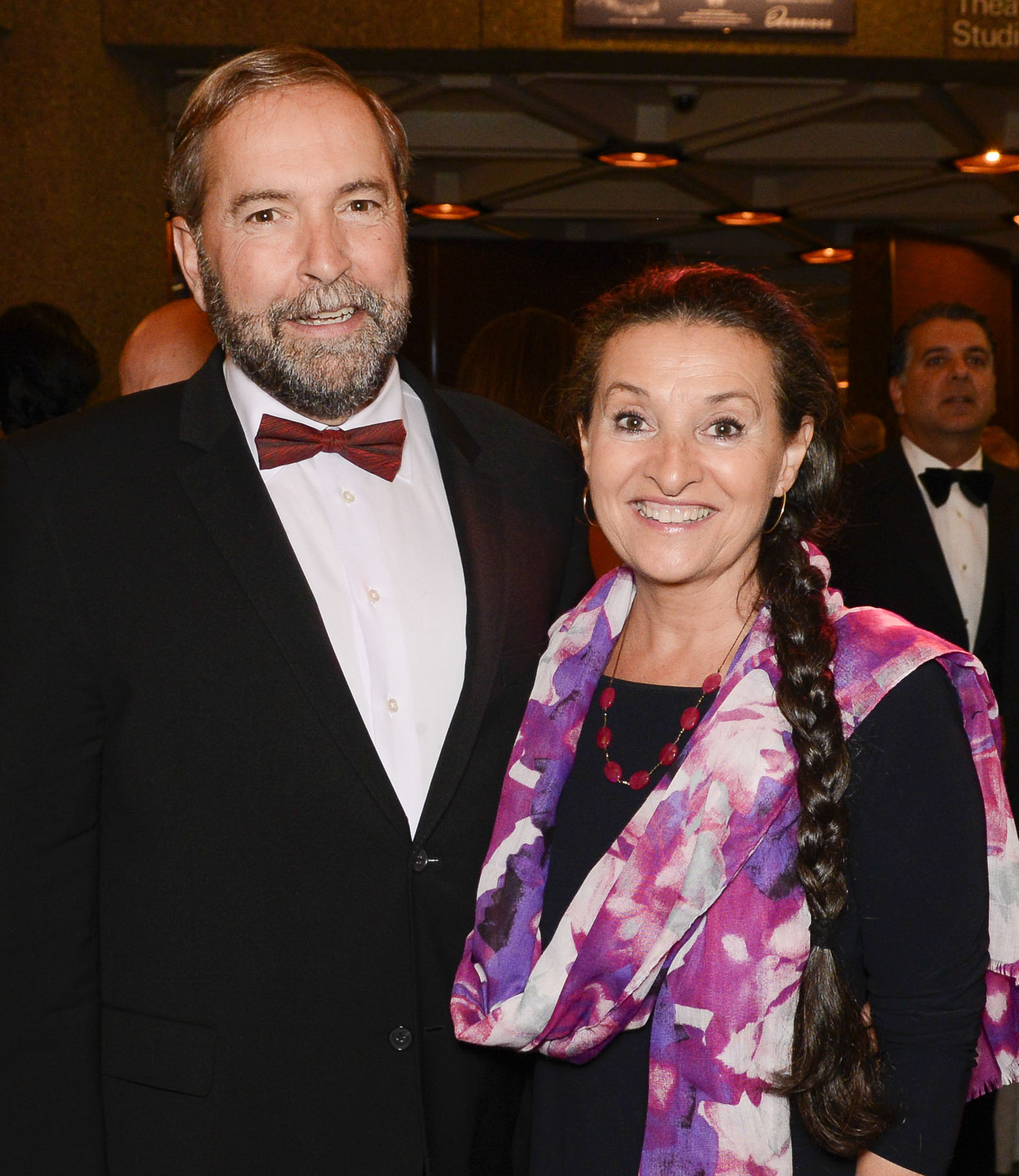Will we look back on 2013 as the year the Harper Conservative interregnum in Canada began to fall apart?
Dec 1st, 2013 | By Randall White | Category: In Brief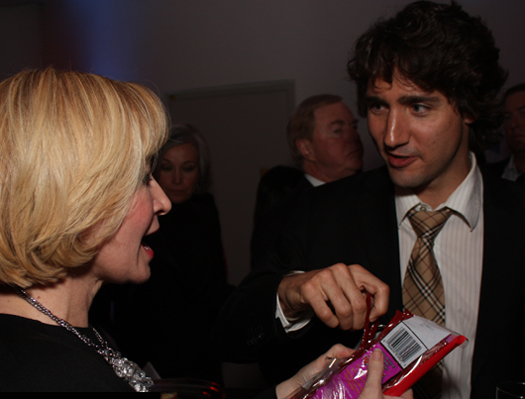
Is this Laureen Harper actually offering Justin Trudeau the Government of Canada, at some recent secret meeting of an Ottawa secret society? No, she is just politely offering him some Twizzlers at a party thrown by the Heritage Minister in the spring of 2010. To bad she isn’t in the Canadian House of Commons with more Twizzlers these days?
Back in the middle of April, just after Justin Trudeau had been elected new leader of the Liberal Party of Canada, former prime minister Jean Chretien boldly prophesied : “Today marks the beginning of the end of this Conservative government.”
Now that we’ve reached December, it almost looks like 2013 just may the year when the strange concoction of clever strategy, mindless bullying, and sheer good luck that has been nourishing the new world order of Stephen Harper for the past seven years began to lose its way.
The ultimate proof, of course, is still almost two years off –Â in the fixed date federal election of October 19, 2015. And even beyond the ranks of extreme partisans of Mr. Harper’s new Conservative Party of Canada, there are still those who say, well yes, the Canadian people are beginning to tire of the Harper government. But it probably has enough juice left to win one more election – while its still divided progressive opposition sorts itself out.
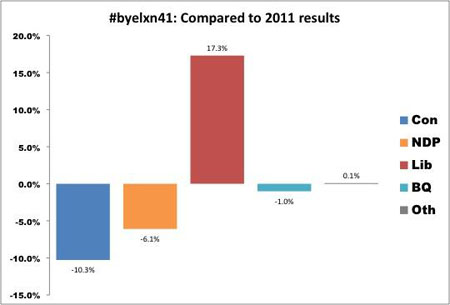
Voting shifts between May 2011 general election and four November 2013 by-elections. From Paul Wells at Maclean’s, “with thanks to University of Calgary political scientist Paul Fairie.”
There is likely enough at least something to this argument. Neither the November 25 by-elections (“Top by-election winner: Justin Trudeau”) nor the latest opinion polls (“Liberals take 6-point national lead, advance in key provinces: poll” ; “Liberals maintain solid lead over Tories, new poll suggests“) seriously hint at any new Liberal majority government looming in the wings.
The theory that the New Democrats are at last about to replace the Liberals as the main progressive opposition to the new Harper Conservatives is certainly looking quite tarnished. But the new Quebec-leaning New Democrats under Thomas Mulcair still have more weight and heft than they used to. And there remain very few signs of even the minimal kind of Liberal-NDP co-operation that would be required to sustain a Justin Trudeau (or, for that matter, a Thomas Mulcair) minority government.
At the same time, the theory that the Harper government will probably win one last kick at the can in October 2015 also ignores the extent to which the latest Conservative miracle in Canada has always depended on a calculated mystique of fragile political tricks, with a risky shelf life at best. (They talk about steady hands at the wheel, but keep crashing through the ice.)
* * * *
It is true enough that Stephen Harper has, so to speak, by all the accepted rules of the game, “won” three successive federal elections. Yet his first two victories, in 2006 and 2008, brought him only minority governments. And even the 54% majority of seats in the Canadian House of Commons that he won in 2011 was a feat of political arithmetic rather than a democratic triumph – secured with less than 40% of the cross-Canada popular vote (and with an almost fluke 69% of the 106 Ontario seats that current opinion polls suggest may prove very hard to retain in 2015).
Moreover, the purported Harper Conservative respect for the Canadian past apparently does not include much real understanding of Canadian political history since the election of Wilfrid Laurier’s Liberal party in 1896. The Laurier Liberals became the “natural governing party” of Canada in the 20th century because they were the only federal party with serious support in French-speaking Quebec. In the year 2013 it seems quite possible to conclude that Stephen Harper’s new Conservative Party of Canada is very much like all the other Canadian Conservative parties of the past 100 years and more (with the short-lived and unusual exception of the old Progressive Conservatives under Brian Mulroney from Quebec).
In this sense it is also no accident that in 2013 both the Liberals and the New Democrats have leaders from Quebec. (Or at least representing ridings in Quebec : there is a plausible enough argument that Justin Trudeau is also from BC on Canada’s Pacific Coast, where his mother was born and raised – and where he taught school for a time himself.)
Similarly, the Harper Conservatives in this respect started well, with their late November 2006 sponsorship of the proposition that the Quebecois constitute a nation within a united Canada. But their base would just not accommodate this new vision in the end. And the Harper government’s subsequent efforts to officially revive the anglophone cultural imperialism of the British monarchy in Canada have become just one more sign of its allegiance to a very old-fashioned (English) Canadian conservatism, that has almost never been able to make significant inroads in Quebec.

Mr and Mrs Canada Canoe – Justin Trudeau and family. Justin and Sophie are expecting another child in March 2014.
Mr. Harper does deserve some credit and even praise as a Western Canadian (albeit born and raised in Ontario), who has diligently learned to speak some more or less acceptable French – and who has insisted that his Conservative government scrupulously respect the niceties of modern Canadian official bilingualism. Mr. Harper’s greatest and undeniable achievement has probably been to bring Western Canada into the (such as they are) corridors of power in Ottawa at last. And Mme Maurois’s Parti Quebecois minority government in the lower St. Lawrence valley continues to show us everywhere in the rest of Canada that the long nightmare of Quebec separatism is not quite over yet!
Down the road, however, the largest significance of the 2011 Canadian federal election actually may be how it showed that Quebec remains a crucial and even interested enough part of Canada. In the very end les Quebecois are also the first people who called themselves Canadians. You cannot govern Canada for any great length of time without some depth of support in Quebec. And the Harper Conservatives – like most Canadian Conservatives since the death of John A. Macdonald (and his crucial early francophone partner, Georges Etienne Cartier) – just do not have this kind of support. For this reason alone they cannot seriously assume the mantle of Canada’s natural governing party. And in early December 2013, at least, it seems likely enough that they will not be able to finally win even another minority government in Ottawa, on October 19, 2015!
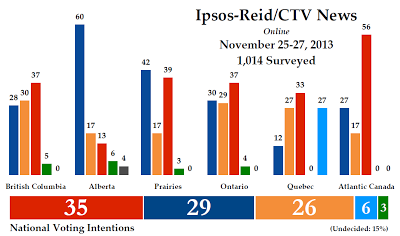
The latest Ipsos Reid poll, with Libs in red, Cons in dark blue, ND in orange, BQ in light blue, and Greens in Green. From Eric Grenier’s ThreeHundredEight.com.
Randall White is the author of a number of books on Canadian history and politics, including Voice of Region : The Long Journey to Senate Reform in Canada, and Ontario Since 1985.
